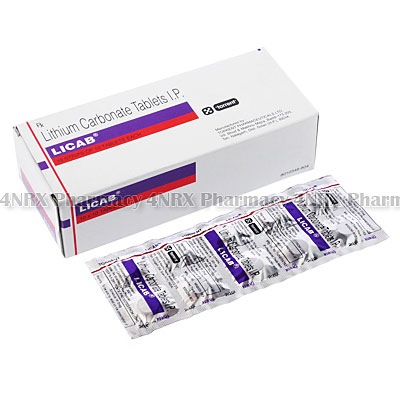 |
Home  Antidepressants Antidepressants  Licab (Lithium Carbonate) Licab (Lithium Carbonate) |
|
|||||||||
|
Licab (Lithium Carbonate)
What is Licab (Lithium Carbonate) used for? Licab (Lithium Carbonate) is an antidepressant that is used to treat manic depressive disorder or bipolar disorder. This drug works by affecting the flow of sodium through the nerve and muscle cells in the body. It is effective in treating the symptoms of manic episodes, such as hyperactivity, anxiety, aggressive behaviour, anger, rapid speech and exaggerated feelings of well being, while also helping to reduce the frequency or intensity of manic episodes. How should I use Licab (Lithium Carbonate)? Licab (Lithium Carbonate) should be taken orally, immediately after meals. Adult patients should take this medication 3 to 4 times daily, or as directed by their physician. It is important to drink plenty of water each day while taking this medication. Adult patients are often directed to drink 8 to 12 glasses of water per day. While taking this medication, patients should take care to maintain a healthy diet, with normal amounts of salt, as changes in the amount of salt in the patient's diet may affect the levels of lithium in the blood. You should never exceed the dosage prescribed to you by your physician. What are the side effects of Licab (Lithium Carbonate)? Some side effects which may occur as a result of taking Licab (Lithium Carbonate) include:
Consult your physician immediately if any of these side effects persist or worsen, or if you notice diarrhea, vomiting, fever, fainting, changes in vision, seizures, an unusual heartbeat or swelling in the joints. Please Note Strictly follow all instructions provided to you by your physician or pharmacist while using Licab (Lithium Carbonate). Optimum and safe dosage can differ based on the patient and the condition being treated. As this medication may be unsafe for certain patients, it is essential you always inform your physician if you are pregnant or breastfeeding, as well as if you have any allergies, other illnesses, or ongoing health conditions, especially heart disease, kidney illnesses or thyroid problems, and if you are taking any other form of medication, supplements, or herbal products. Patients should keep all medical appointments while taking lithium, as it is important that your physician monitors you closely while taking this medication, in order to ensure that the correct amount of lithium is being taken. Immediately seek emergency medical care if you have any allergic or hypersensitive reaction. Common signs of a reaction include hives, swelling, skin rashes, chest pains, as well as trouble breathing or swallowing. 
|
|||||||||||||||||